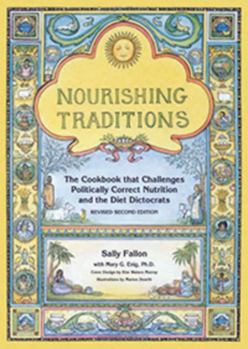Nourishing Traditions: The Cookbook That Challenges Politically Correct Nutrition and the Diet Dictocrats
Select Format
Select Condition 
Book Overview
This well-researched, thought-provoking guide to traditional foods contains a startling message: Animal fats and cholesterol are not villains but vital factors in the diet, necessary for normal growth, proper function of the brain and nervous system, protection from disease and optimum energy levels. Sally Fallon dispels the myths of the current low-fat fad in this practical, entertaining guide to a can-do diet that is both nutritious and delicious.
Nourishing Traditions will tell you:
Why your body needs old fashioned animal fats Why butter is a health food How high-cholesterol diets promote good health How saturated fats protect the heart How rich sauces help you digest and assimilate your food Why grains and legumes need special preparation to provide optimum benefits About enzyme-enhanced food and beverages that can provide increased energy and vitality Why high-fiber, lowfat diets can cause vitamin and mineral deficienciesTopics include the health benefits of traditional fats and oils (including butter and coconut oil); dangers of vegetarianism; problems with modern soy foods; health benefits of sauces and gravies; proper preparation of whole grain products; pros and cons of milk consumption; easy-to-prepare enzyme enriched condiments and beverages; and appropriate diets for babies and children.






